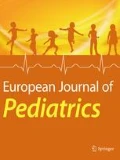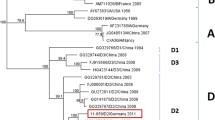Abstract
Ten neonates with coxsackie B viral infection presented over a 3-month period. Clinical features included meningoencephalitis, thrombocytopenia, disseminated intravascular coagulopathy, cardiomyopathy, and hepatitis. Eight infants had multiorgan disease, four with severe myocardial dysfunction, of whom two died. All of the infants with severe disease developed symptoms within 7 days of age. In infants presenting within 10 days of birth, in all cases there were symptoms compatible with maternal infection prior to delivery. Severity was associated with perinatal transmission. Enteroviral polymerase chain reaction of CSF, urine, stool or throat swab was positive in nine of the ten babies. Seven of the infants were treated with a 7-day course of the new anti-picornaviral drug pleconaril (5 mg/kg 3 times daily). Conclusion: these cases highlight the importance of not missing coxsackie B viral infection in the differential diagnosis of the septic neonate, especially as there is now a potential treatment.


Similar content being viewed by others
Abbreviations
- DIC :
-
disseminated intravascular coagulopathy
- IVIG :
-
intravenous immunoglobulin
- PCR :
-
polymerase chain reaction
References
Abzug MJ (2001) Prognosis for neonates with enterovirus hepatitis and coagulopathy. Pediatr Infect Dis J 20: 758–763
Abzug MJ, Levin MJ, Rotbart HA (1993) Profile of enterovirus disease in the first two weeks of life. Pediatr Infect Dis J 12: 820–824
Abzug MJ, Keyserling HL, Lee ML, Levin MJ, Rotbart HA (1995) Neonatal enterovirus infection: virology, serology, and effects of intravenous immune globulin. Clin Infect Dis 20: 1201–1206
Abzug MJ, Loeffelholz M, Rotbart HA (1995) Diagnosis of neonatal enterovirus infection by polymerase chain reaction. J Pediatr 126: 447–450
Abzug MJ, Cloud G, Bradley J, Sanchez PJ, Romero J, Powell D, Lepow M, Mani C, Capparelli EV, Blount S, Lakeman F, Whitley RJ, Kimberlin DW (2003) Double blind placebo-controlled trial of pleconaril in infants with enterovirus meningitis. Pediatr Infect Dis J 22: 335–341
Aquino VM, Farah RA, Lee MC, Sandler ES (1996) Disseminated coxsackie A9 infection complicating bone marrow transplantation. Pediatr Infect Dis J 15: 1053–1054
Aradottir E, Alonso EM, Shulman ST (2001) Severe neonatal enteroviral hepatitis treated with pleconaril. Pediatr Infect Dis J 20: 457–459
Bauer S, Gottesman G, Sirota L, Litmanovitz I, Ashkenazi S, Levi I (2002) Severe coxsackie virus B infection in preterm newborns treated with pleconaril. Eur J Pediatr 161: 491–493
Chambon M, Delage C, Bailly JL, Gaulme J, Dechelotte P, Henquell C, Jallat C, Peigue-Lafeuille H (1997) Fatal hepatic necrosis in a neonate with echovirus 20 infection: use of the polymerase chain reaction to detect enterovirus in liver tissue. Clin Infect Dis 24: 523–524
Cherry JD (1992) Enteroviruses: polioviruses (poliomyelitis), coxsackieviruses, echoviruses and enteroviruses. In: Feigin RD, Cherry JD (eds) Textbook of pediatric infectious diseases. Elsevier, Amsterdam, pp 1705–1753
Dagan R, Prather SL, Powell KR, Menegus MA (1983) Neutralizing antibodies to non-polio enteroviruses in human immune serum globulin. Pediatr Infect Dis 2: 454–456
Daley AJ, Gilbert GL, Dwyer DE (2000) Pleconaril therapy and echovirus 33 infection in twins. Program and abstracts of the Annual Conference of Australian Society of Infectious Diseases
Hamilton MS, Jackson MA, Abel D (1999) Clinical utility of polymerase chain reaction testing for enteroviral meningitis. Pediatr Infect Dis J 18: 533–537
Hammond GW, Lukes H, Wells B, Thompson L, Low DE, Cheang M (1985) Maternal and neonatal neutralizing antibody titers to selected enteroviruses. Pediatr Infect Dis 4: 32–35
Hayden FG, Herrington DT, Coats TL, Kim K, Cooper EC, Villano SA, Liu S, Hudson S, Pevear DC, Collett M, McKinlay M (2003) Efficacy and safety of oral pleconaril for treatment of colds due to picornaviruses in adults: results of 2 double-blind, randomized, placebo-controlled trials. Clin Infect Dis 36: 1523–1532
Hoi-Shan CS, Lun KS (2001) Ventricular aneurysm complicating neonatal coxsackie B4 myocarditis. Pediatr Cardiol 22: 247–249
Hornung TS, Bernard EJ, Howman-Giles RB, Sholler GF (1999) Myocardial infarction complicating neonatal enterovirus myocarditis. J Paediatr Child Health 35: 309–312
Hyypia T, Auvinen P, Maaronen M (1989) Polymerase chain reaction for human picornaviruses. J Gen Virol 70: 3261–3268
Jan SL, Chi CS, Hwang B, Fu YC, Chen PY, Mak SC (2000) Cardiac manifestations of fatal enterovirus infection during the 1998 outbreak in Taiwan. Chung Hua I Hsueh Tsa Chih (Taipei) 63:612–618
Jarett S, Heymann S, Mundel B (1956) Myocarditis in the newborn infant. J Pediatr 48: 1–22
Jenista JA, Powell KR, Menegus MA (1984) Epidemiology of neonatal enterovirus infection. J Pediatr 104: 685–690
Johnston JM, Overall JC Jr (1989) Intravenous immunoglobulin in disseminated neonatal echovirus 11 infection. Pediatr Infect Dis J 8: 254–256
Juhela S, Hyoty H, Lonnrot M, Roivainen M, Simell O, Ilonen J (1998) Enterovirus infections and enterovirus specific T-cell responses in infancy. J Med Virol 54: 226–232
Kibrick S (1961) Viral infections in the fetus and newborn. Perspect Virol 2: 140–159
Lake AM, Lauer BA, Clark JC, Wesenberg RL, McIntosh K (1976) Enterovirus infections in neonates. J Pediatr 89: 787–791
McKinney RE Jr, Katz SL, Wilfert CM (1987) Chronic enteroviral meningoencephalitis in agammaglobulinemic patients. Rev Infect Dis 9: 334–356
McLean D, Donohue W, Snelling C, Wyllie S (1961) Coxsackie B5 virus as a cause of neonatal encephalomyelitis and myocarditis. Can Med Assoc J 85: 1046–1048
Modlin JF (1986) Perinatal echovirus infection: insights from a literature review of 61 cases of serious infection and 16 outbreaks in nurseries. Rev Infect Dis 8: 918–926
Modlin JF (1988) Perinatal echovirus and group B coxsackievirus infections. Clin Perinatol 15: 233–246
Modlin JF, Rotbart HA (1997) Group B coxsackie disease in children. Curr Top Microbiol Immunol 223: 53–80
Moore M KM (1984) Epidemiologic, clinical and laboratory features of coxsackie B1–5 infections in the United States, 1970–79. Public Health Rep 99: 515–522
Morens DM (1978) Enteroviral disease in early infancy. J Pediatr 92: 374–377
Nigrovic LE, Chiang VW (2000) Cost analysis of enteroviral polymerase chain reaction in infants with fever and cerebrospinal fluid pleocytosis [see comments]. Arch Pediatr Adolesc Med 154: 817–821
Nowak-Wegrzyn A, Phipatanakul W, Winkelstein JA, Forman MS, Lederman HM (2001) Successful treatment of enterovirus infection with the use of pleconaril in 2 infants with severe combined immunodeficiency. Clin Infect Dis 32: E13–E14
Parasuraman TV, Deverka PA, Toscani MR (1999) Estimating the economic impact of viral meningitis in the United States. International Society for Pharmacoeconomics and Outcomes Research, 4th Annual International Meeting
Pevear DC, Tull TM, Seipel ME, Groarke JM (1999) Activity of pleconaril against enteroviruses. Antimicrob Agents Chemother 43: 2109–2115
Ramers C, Billman G, Hartin M, Ho S, Sawyer MH (2000) Impact of a diagnostic cerebrospinal fluid enterovirus polymerase chain reaction test on patient management. JAMA 283: 2680–2685
Rogers JM, Diana GD, McKinlay MA (1999) Pleconaril. A broad spectrum antipicornaviral agent. Adv Exp Med Biol 458: 69–76
Romero JR, Hinrichs S, Perry D (1998) Impact of reverse transcription-polymerase chain reaction diagnosis of enterovirus infections on the care of febrile children. Pediatr Res 43: 156A
Romero JR (2001) Pleconaril: a novel antipicornaviral drug. Expert Opin Investig Drugs 10: 369–379
Rotbart HA (1999) Antiviral therapy for enteroviral infections. Pediatr Infect Dis J 18: 632–633
Rotbart HA, Webster A (2001) Treatment of potentially life-threatening enterovirus infections with pleconaril. Clin Infect Dis 32:228–235
Rotbart HA, Jones A, Novelli V (1997) Pleconaril treatment of chronic enteroviral central nervous system infections in children with agammaglobulinaemia. Program and Abstracts of the 37th Interscience Conference on Antimicrobial Agents and Chemotherapy Washington DC: American Society for Microbiology
Rotbart HA, McCracken GH, Whitley RJ, Modlin JF, Cascino M, Shah S, Blum D (1999) Clinical significance of enteroviruses in serious summer febrile illnesses in children. Pediatr Infect Dis 18: 869–874
Sawyer MH (2002) Enterovirus infections: diagnosis and treatment. Semin Pediatr Infect Dis 13: 40–47
Sawyer MH, Saez-Llorenz X, Luz-Aviles C (1999) Oral pleconaril reduces the duration and severity of enteroviral meningitis in children. Program and Abstracts of the 39th Interscience Conference on Antimicrobial Agents and Chemotherapy Washington DC: American Society for Microbiology
Schiff G, Sherwood J (2000) Clinical activity of pleconaril in an experimentally induced coxsackie A21 respiratory infection. J Infect Dis 181: 20–26
Schlesinger Y, Sawyer MH, Storch GA (1994) Enteroviral meningitis in infancy: potential role for polymerase chain reaction in patient management. Pediatrics 94: 157–162
Shafran S, Halota W, Gilbert D, Bernstein J, Reiss M, The Collaborative Meningitis Group (1999) Pleconaril is effective for enteroviral meningitis in adolescents and adults:a randomized placebo-controlled mulitcenter trial. Program and Abstracts of the 39th Interscience Conference on Antimicrobial Agents and Chemotherapy Washington DC: American Society for Microbiology
Spicher VM, Berclaz PY, Cheseaux JJ, Morandi PA, Suter S, Wunderli W, Siegrist CA (2000) Detection of enteroviruses in the cerebrospinal fluid by polymerase chain reaction: prospective study of impact on the management of hospitalized children. Clin Pediatr (Phila) 39: 203–208
Takami T, Kawashima H, Takei Y, Miyajima T, Mori T, Nakayama T, Takekuma K, Hoshika A (1998) Usefulness of nested PCR and sequence analysis in a nosocomial outbreak of neonatal enterovirus infection. J Clin Virol 11: 67–75
Tubman TR, Craig B, Mulholland HC (1990) Ventricular tachycardia associated with coxsackie B4 virus infection. Acta Paediatr Scand 79: 572–575
Verboon-Maciolek MA, Krediet TG, van Loon AM, Kaan J, Galama JM, Gerards LJ, Fleer A (2002) Epidemiological survey of neonatal non-polio enterovirus infection in the Netherlands. J Med Virol 66: 241–245
Verboon-Maciolek MA, Nijhuis M, van Loon AM, van Maarssenveen N, van Wieringen H, Pekelharing-Berghuis MA, Krediet TG, Gerards LJ, Fleer A, Diepersloot RJ, Thijsen SF (2003) Diagnosis of enterovirus infection in the first 2 months of life by real-time polymerase chain reaction. Clin Infect Dis 37: 1–6
Yarush LI, Steele RW (2000) Diagnosis and prospective treatment of enteroviral infections in children [editorial]. Clin Pediatr (Phila) 39: 209–211
Author information
Authors and Affiliations
Corresponding author
Rights and permissions
About this article
Cite this article
Bryant, P.A., Tingay, D., Dargaville, P.A. et al. Neonatal coxsackie B virus infection—a treatable disease?. Eur J Pediatr 163, 223–228 (2004). https://doi.org/10.1007/s00431-004-1408-y
Received:
Accepted:
Published:
Issue Date:
DOI: https://doi.org/10.1007/s00431-004-1408-y




